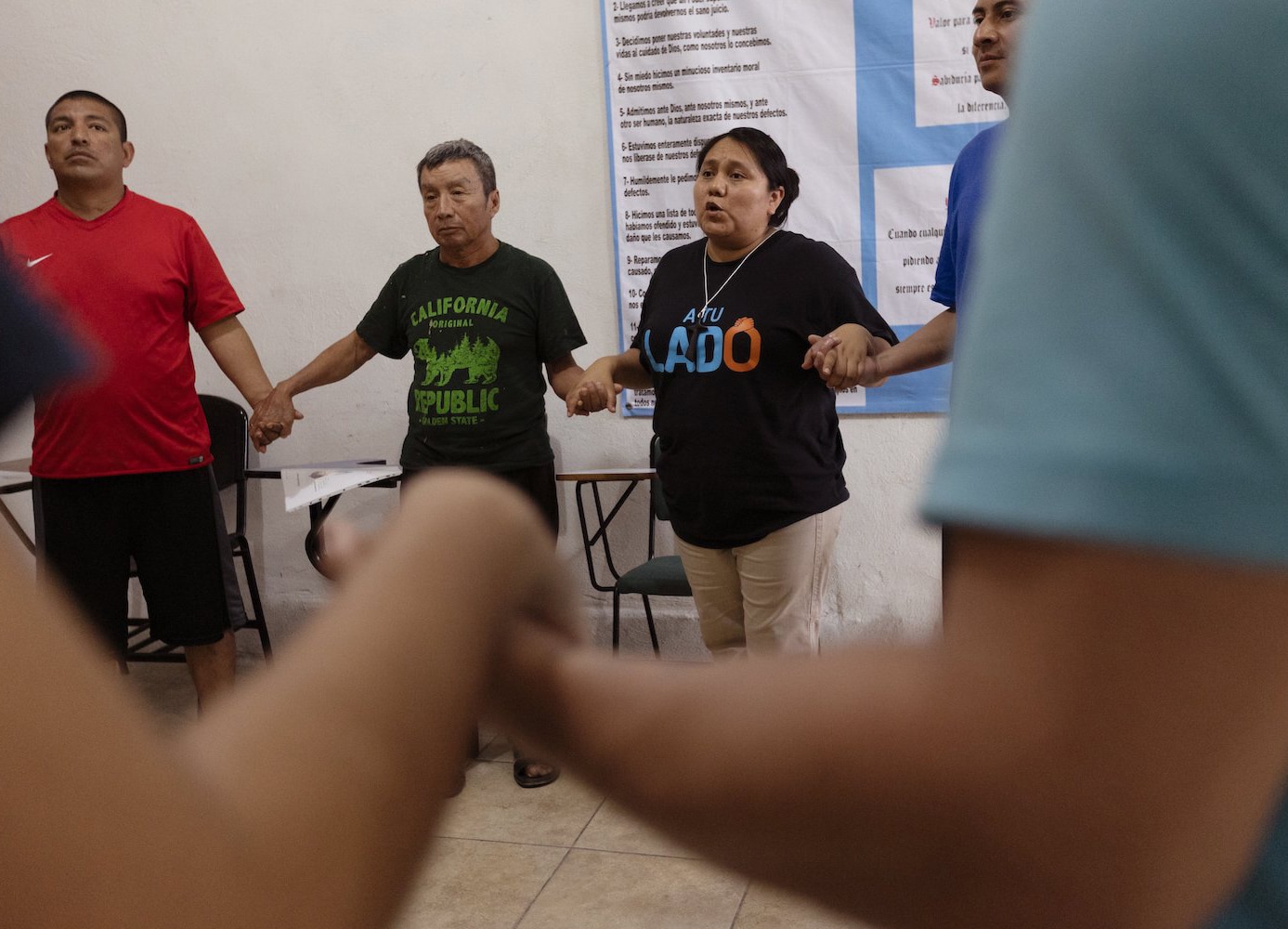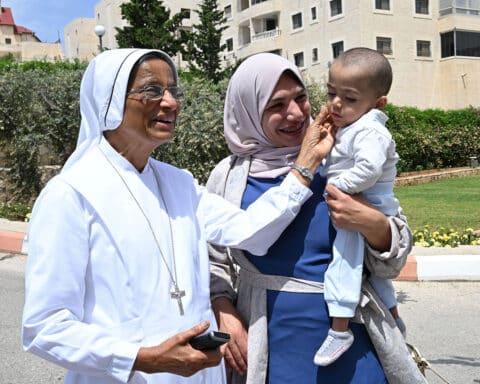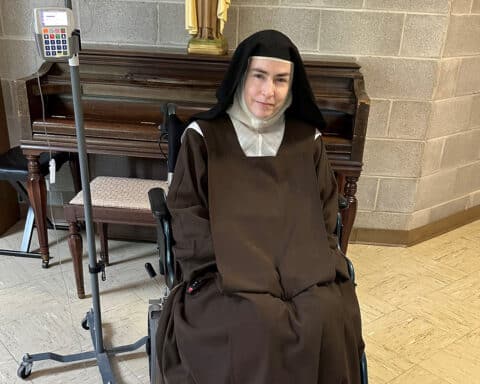MONTERREY, Mexico (OSV News) — Climbing the stairs to the second floor of the Casa Guerrero drug rehabilitation center, visitors hear voices get louder and louder. Behind a locked doorway of iron bars, male patients form a circle and shout in unison as lay missionary Josseline Montes Jiménez leads them through a series of praise acclamations.
“As to violence and drug addiction, Christ is the solution!” the men shout in Spanish.
Some close their eyes and tilt their heads toward the ceiling while one man clasps his hands. Sister Sandra López García and Montes Jiménez, 23, have kicked off their visit with energy and enthusiasm.
“Always with the sisters it is very relaxing, dynamic, and they are well received,” Brenda Guerrero Guerra, the center’s founder, told Global Sisters Report. “They get them out of their routine. The young men look forward to Fridays when the little sisters come.”
A ministry for gang members and cartels
Since 2020, Sister Sandra, a Society of Mary of Nazareth sister, and her missionary team have regularly visited youths and young men in six drug rehab centers across Monterrey. Their mission is to minister to the “chavos banda,” youth gang members who, though less violent than those affiliated with cartels, often find themselves addicted as they face the challenges of day-to-day living in the city’s most impoverished areas. The sister said they bring support, inspire patients to kick their drug habits, evangelize and offer an antidote to loneliness.
“There are some where the patients already have many mental problems and are forgotten by their families,” Sister Sandra said. In Mexico, relatives can bring patients to rehab centers against their will following a procedure of psychological testing and interviews. “They are there hoping that someone will take them out. When the situation is this complicated, we just tell ourselves to listen, talk and play.”
Society and the government are indifferent to young people who fall into drugs and few organizations are working to help them, Guerrero Guerra said. “The main support we have is from the sisters of the Society of Mary of Nazareth, who not only accompany us and are with the guys weekly, but also lend us this house so that we can be here.”
With a capacity for 20 patients and located in Guadalupe, a municipality on the edge of Monterrey, Casa Guerrero exists courtesy of the Society of Mary of Nazareth sisters who loan the building to Guerrero Guerra for her center.
Increasing rates of addiction
The rate of drug addiction in Monterrey has been increasing in the last seven years due to the arrival of drugs such as crystal meth, which affects mostly men from low-income areas between 20 and 40 years old, Guerrero Guerra said. “Before, in a treatment center, there were 40 people; today, twice as many people are being treated.”
The ministry came about when Sister Sandra and her missionary team noticed the number of bandas hanging out in the streets was dwindling. They often walked the streets and evangelized to these groups. It was around 2011, and the cartels had recently arrived in Monterrey setting off a violent period, according to news reports.
If gang members refused to sell drugs, they were killed. From 2012 to 2014, Sister Sandra said she and her fellow sisters regularly attended funerals of youths and young men aged 12 to 20 years. Others were so addicted, they ended up in treatment. The sisters connected the dots and realized that to reach the banda members, they had to go where they were: in the rehab centers.
‘I know that I can do it with God’s help’
Inside Casa Guerrero’s living room, Sister Sandra and Montes Jiménez begin their session with an icebreaker called “Rabbits and Rabbit Pens.”
As Sister Sandra calls out “Rabbit pens!” the men scurry about trying to find an available pen made up of two people holding hands with arms outstretched, much like children playing musical chairs.
Following the game, the sister and Montes Jiménez pass around a “wheel of emotions” diagram which lists a series of emotional states and feelings.
“How are you feeling today?” Montes Jiménez asked. Frustration, sadness, excitement and joy, were some of the emotions expressed.
“I feel good, although I still need to recover more, but I feel good,” Fausto Andrés Tomas, 23, said. “I know that I can do it with God’s help. I arrived a month ago, but I have learned good things here. It has helped me a lot to live with others.”
Later, patients sat down to listen to a motivational fable that tapped into their own personal qualities. As they shared what they knew about their own potential to overcome drug addiction, López García guided the men on a path of personal introspection, creating an atmosphere of reflection and trust.
Finding happiness and joy
“I feel happy and joyful with what we live here,” Mateo Natanael Morales Cabello, an 18-year-old patient, said. “My family brought me here and at first I took it badly. But now I am much calmer. I already want to go out and continue studying. When the sisters come, I talk to them and they help me find and understand my feelings.”
According to Sister Sandra, who also is a psychologist, she and her team only work in rehabilitation centers that avoid physical violence, as this is consistent with the evangelization process that the Society of Mary of Nazareth has developed. The sisters’ charism focuses on the accompaniment of at-risk young people.
“Only they know their own story of why they take refuge in drugs, even if they later realize that they hurt themselves,” Sister Sandra said. Then, paraphrasing theologian José Antonio Pagola, she added, “Jesus offers forgiveness even before there is repentance.”
Near the end of the visit, Sister Sandra again used the “wheel of emotions” to ask the patients about their mood, this time hearing more positive responses.
Then she closed out the session with a moment of silence, followed by the Our Father and more acclamations.
Once again, the men shouted: “Jesus, you are my light, you are my peace and with you, my life will change.”
Nuri Vallbona, a freelance documentary photojournalist, and Luis Donaldo González, who is based on the U.S.-Mexico border, write for Global Sisters Report.





